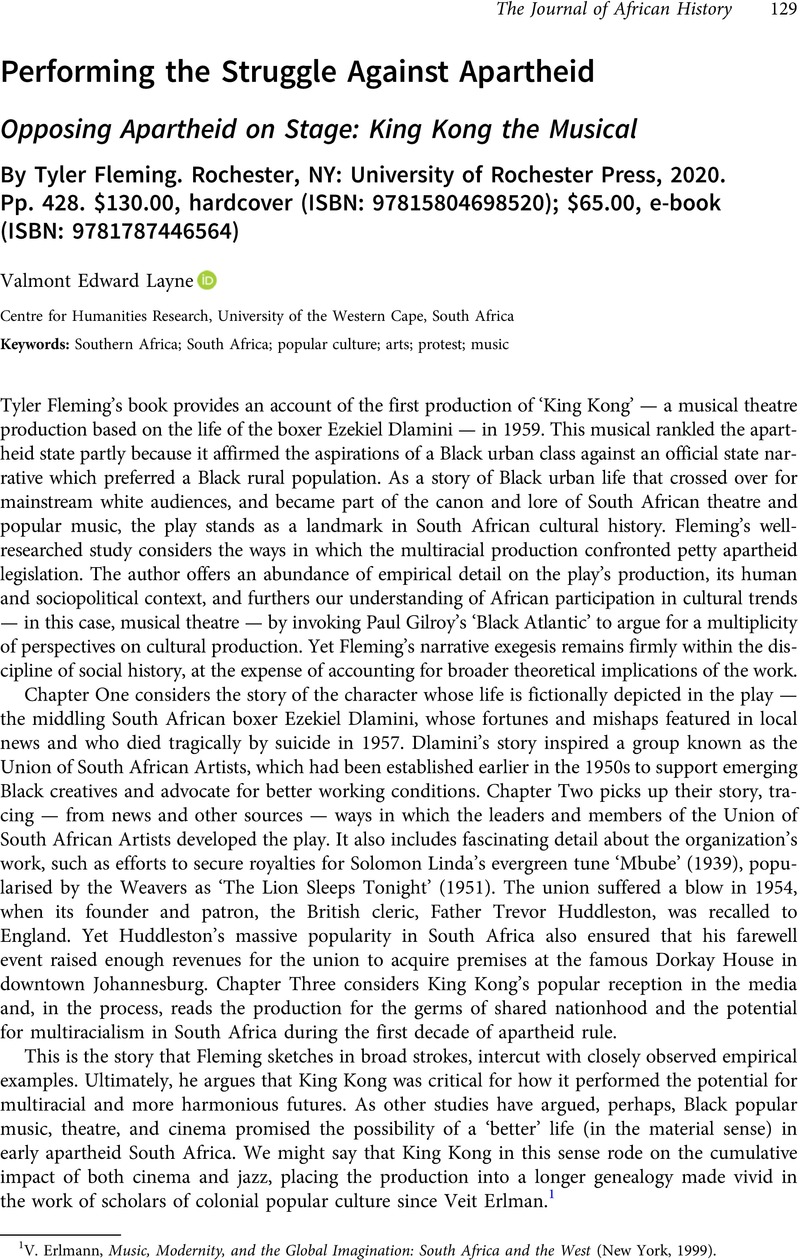No CrossRef data available.
Article contents
Performing the Struggle Against Apartheid - Opposing Apartheid on Stage: King Kong the Musical By Tyler Fleming. Rochester, NY: University of Rochester Press, 2020. Pp. 428. $130.00, hardcover (ISBN: 97815804698520); $65.00, e-book (ISBN: 9781787446564)
Review products
Published online by Cambridge University Press: 20 February 2023
Abstract

- Type
- Book Review
- Information
- Copyright
- Copyright © The Author(s), 2023. Published by Cambridge University Press
References
1 Erlmann, V., Music, Modernity, and the Global Imagination: South Africa and the West (New York, 1999)CrossRefGoogle Scholar.
2 In 2017 the now defunct Fugard Theatre in Cape Town created a new production of the musical King Kong, produced this time by Eric Abrahams. On its YouTube page, the Fugard Theatre announced, ‘After nearly 60 years, the week has arrived… KING KONG welcomes its first audience again on 25 July!’: The Fugard Theatre, ‘King Kong South Africa – A Reflection’, 2017, https://www.youtube.com/watch?v=_-JOYA2Cn-4.
3 See Jaji, T., Africa in Stereo: Modernism, Music, and Pan-African Solidarity (Oxford, 2014)CrossRefGoogle Scholar; V. Erlmann, Music, Modernity, and the Global Imagination; Allen, L., ‘Commerce, politics, and musical hybridity: vocalizing urban Black South African identity during the 1950s’, Ethnomusicology, 47:2 (2003), 228–49CrossRefGoogle Scholar.
4 See Erb, C. M., Tracking King Kong: A Hollywood Icon in World Culture (Detroit, 2009)Google Scholar. It is suggestive that the King Kong film's creator Merian C. Coopers was steeped in the imperial theatre of the nineteenth century — e.g. he had become fascinated with gorillas through explorer accounts of Equatorial Africa. Also Maingard, J., ‘Projecting modernity: Sol Plaatje's touring cinema exhibition in 1920s South Africa’, in Gennari, D. Treveri, Hipkins, D., and O'Rawe, C. (eds.), Rural Cinema Exhibition and Audiences in a Global Context (Cham, 2018), 187–202CrossRefGoogle Scholar.
5 Dovey, L. and Impey, A., ‘African Jim: sound, politics, and pleasure in early “Black” South African cinema’, Journal of African Cultural Studies, 22:1 (2010), 57–73CrossRefGoogle Scholar.
6 Ibid., 60.
7 See, for example: Felber, G., ‘Tracing tribe: Hugh Tracey and the cultural politics of retribalisation’, SAMUS: South African Music Studies, 30–1:1 (2010), 31–43Google Scholar; Amoros, L. Gimenez, Tracing the Mbira Sound Archive in Zimbabwe (London, 2018)CrossRefGoogle Scholar.





